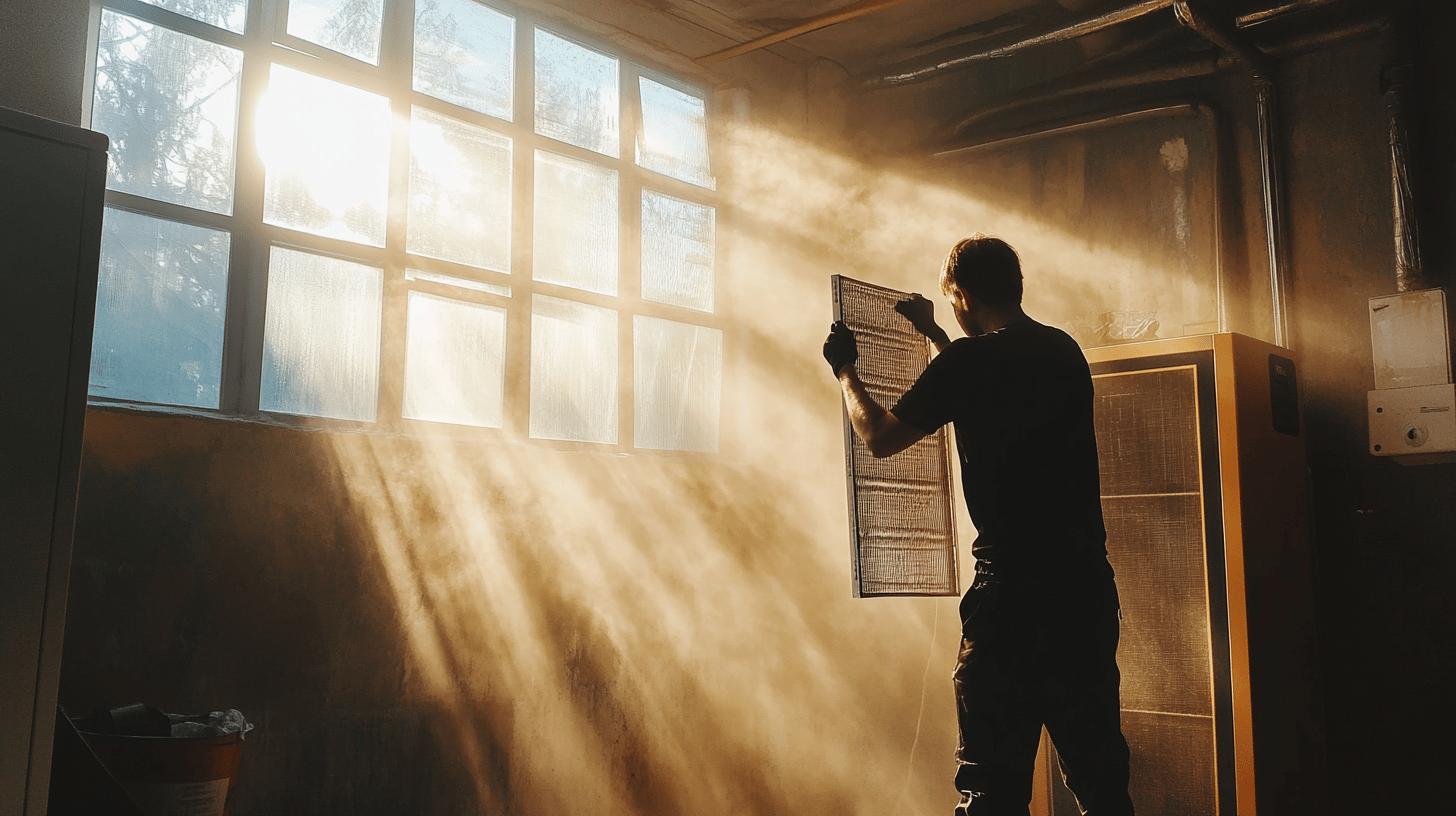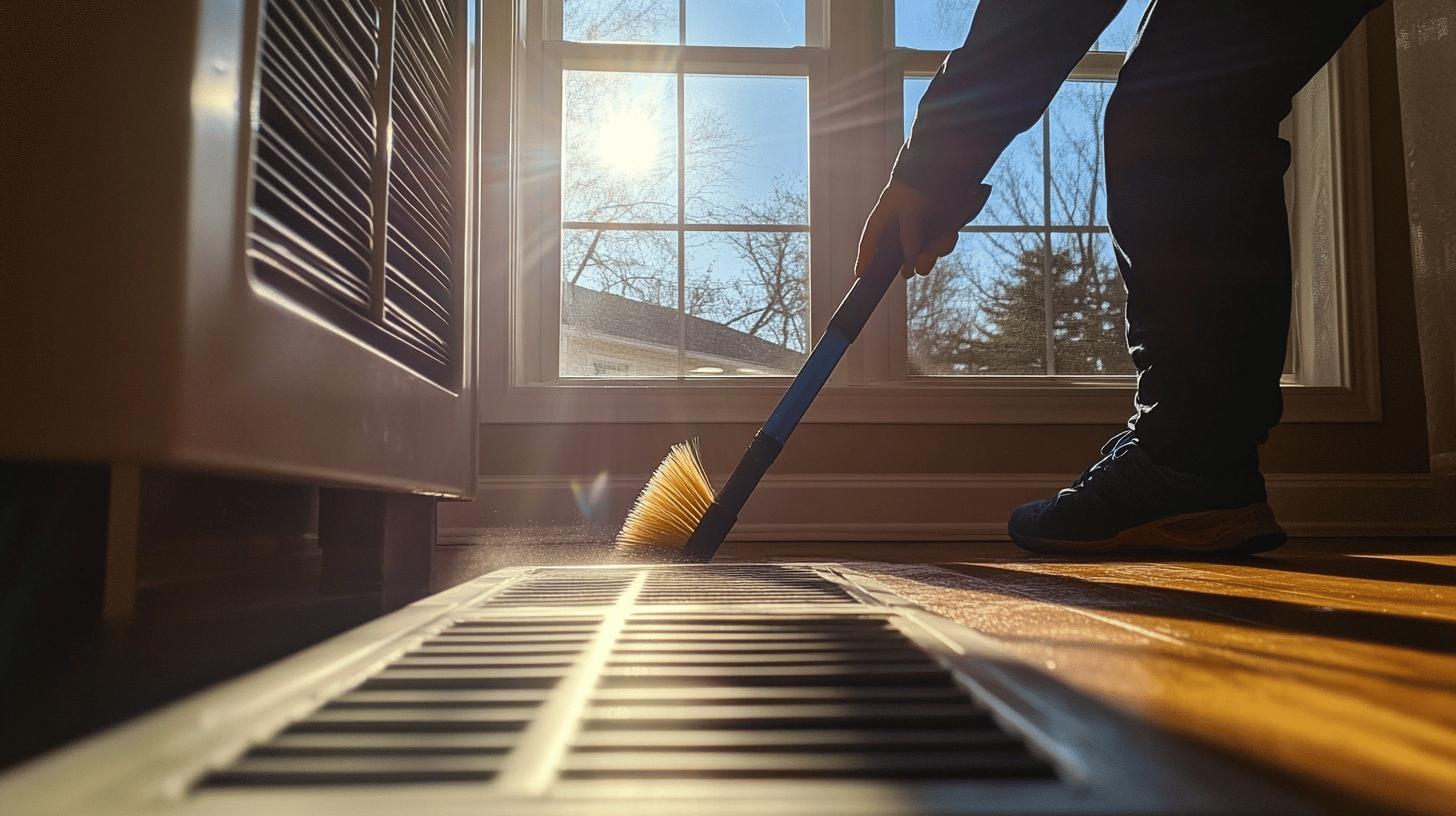Neglecting regular cleaning can transform these essential units into breeding grounds for dust, mold, and other harmful contaminants. Over time, this can deteriorate indoor air quality and exacerbate respiratory issues. Maintaining a clean HVAC system isn’t just about cleanliness—it’s about safeguarding your well-being and optimizing efficiency. In this article, we will explore why cleaning your HVAC system is crucial and delve into the health benefits of keeping it in top shape. Keep reading to explore: Do HVAC systems need cleaning? Here is your answer.
Why HVAC Systems Need to Be Cleaned
Keeping your HVAC system clean is vital for good indoor air quality and health. A clean system removes dust, allergens, and pollutants. This helps reduce respiratory problems and allergies. If neglected, HVAC systems can harbor mold, fungi, and bacteria, circulating these harmful contaminants in the air and posing health risks.
- Health Benefits of Clean HVAC Systems:
- Improved Respiratory Health: Clean systems reduce allergens and irritants.
- Decreased Allergy Symptoms: Less dust and pollen mean fewer allergy flare-ups.
- Reduced Risk of Asthma Attacks: Cleaner air can minimize asthma triggers.
- Lowered Risk of Infections: Fewer bacteria and viruses circulate in clean systems.
- Enhanced Overall Well-being: Better air quality promotes general health.
Dirty HVAC systems can gather dust, mold spores, and bacteria. Dust clogs air filters and ducts, reducing airflow and efficiency. Mold grows in damp areas, releasing spores into the air. Bacteria and other microorganisms can spread, causing infections and illness. Regular cleaning removes these contaminants, making indoor environments safer and healthier.
Benefits of Regular HVAC Cleaning

Cleaning your HVAC system can greatly improve energy efficiency. By clearing dust and debris that block airflow, a clean system uses less energy to maintain temperatures. This can boost efficiency by up to 15%, leading to savings on utility bills. Less strain on the system improves energy use and keeps your home comfortable efficiently.
Longevity Benefits
Regular HVAC maintenance extends your system’s life. Clean components reduce breakdowns and costly repairs. Well-maintained systems can last 15 to 25 years, offering long-term savings. Poorly maintained systems wear out quickly due to debris and strain, needing earlier replacement.
| Benefit | Description |
|---|---|
| Improved Energy Efficiency | Clean systems use less energy, reducing utility bills by up to 15%. |
| Extended System Lifespan | Regular cleaning prevents wear and tear, prolonging system life to 25 years. |
| Reduced Repair Costs | Maintenance minimizes breakdowns and expensive repairs. |
Regular HVAC cleaning keeps your system efficient and durable. This proactive approach reduces unexpected failures and their costs, ensuring a comfortable and healthy indoor environment for years.
Recommended Cleaning Frequency for HVAC Systems
For optimal performance, clean your system at least once a year. Environments with high dust or allergens may need more frequent cleaning. Regular maintenance ensures efficiency, reduces breakdown risks and extends lifespan. Check and replace air filters every 1 to 3 months to maintain air quality and system efficiency.
- Factors Influencing Cleaning Frequency:
- Environmental Conditions: Areas with high pollution or dust need more frequent cleaning.
- Presence of Pets: Homes with pets require regular maintenance due to shedding and dander.
- System Usage: More heating or cooling means more frequent checks.
- Occupancy Levels: High occupancy leads to faster dust and allergen buildup.
Following a regular maintenance schedule is crucial to prevent dust and contaminant buildup. Ignoring routine checks decreases system efficiency, increases energy costs, and risks health issues from poor air quality. By adhering to recommended cleaning intervals, you keep your HVAC system running smoothly.
Professional HVAC Cleaning vs. DIY Options

Hiring professionals ensures thorough and effective cleaning. They have the expertise and tools to clean every HVAC component, reaching areas DIY might miss. Professionals remove dust, mold, and contaminants, protecting system performance and air quality. Professional services cost $300 to $500 but save on future repairs and extend system life.
DIY Cleaning Methods
Can homeowners clean their HVAC systems? Yes, simple tasks can help maintain your system. Regularly replacing filters, cleaning vents, and clearing debris from the outdoor unit are effective. These tasks require no specialized skill, making them accessible to most homeowners.
- Essential Equipment for DIY Cleaning:
- Vacuum cleaner with a brush attachment
- Screwdriver set for vent removal
- Garden hose for cleaning the outdoor unit
While DIY methods are cost-effective short-term, they might not fix deeper issues. Professional cleaning provides comprehensive maintenance, ensuring all components are thoroughly cleaned. Investing in professional services prevents issues, improves efficiency, and extends your HVAC system’s life.
Signs Your HVAC System Needs Cleaning
Does your HVAC system need cleaning? Look for certain signs. A sudden spike in energy bills could mean a dirty system. Blockages or duct leaks force the system to work harder. Restricted airflow or uneven heating/cooling are also signs cleaning is overdue. The National Air Duct Cleaners Association (NADCA) suggests that visible dust around vents may indicate your ducts need attention.
- Visual Indicators Your System Needs Cleaning:
- Dust buildup around vents and registers
- Mold growth on or near HVAC components
- Unusual odors from the system
A dirty HVAC system reduces efficiency by increasing energy use and strains components, risking breakdowns. Dust and debris cause blockages, overheating, and frequent cycling, leading to wear and tear. Recognizing these signs early and cleaning your system ensures it operates efficiently and effectively.
Final Words
Keeping HVAC systems clean is crucial for maintaining energy efficiency and ensuring good indoor air quality. Regular cleaning prevents the buildup of dust and mold, which can lead to respiratory problems and allergies. Clean HVAC systems not only enhance energy efficiency by up to 15% but also extend the system’s lifespan, potentially saving homeowners from costly repairs or premature replacements.
Choosing between professional cleaning and DIY options depends on individual preference, but recognizing cleaning signs, like dust accumulation and airflow restrictions, is key to timely maintenance. Do HVAC systems need to be cleaned? Absolutely, for optimal performance and health benefits. Your proactive efforts in maintaining a clean HVAC system are a worthwhile investment in your home’s comfort and efficiency.
FAQ
Do HVAC systems need to be cleaned?
Regular cleaning of HVAC systems is crucial for maintaining efficiency and improving indoor air quality. Neglecting this can cause a a buildup of dust and mold, leading to health problems.
Is duct cleaning a waste of money?
Duct cleaning can be beneficial if noticeable contaminants affect air quality. It may not always be necessary to assess based on your home’s specific needs and environmental conditions.
How much does air duct cleaning cost?
Air duct cleaning typically costs between $300 and $500. Pricing varies by system size and the extent of cleaning needed.
What are the drawbacks of duct cleaning?
Duct cleaning can be costly and may not always improve air quality if there are no significant contaminants. Sometimes, ducts can get damaged if not cleaned properly.
How often should an HVAC system be cleaned?
It’s recommended to clean HVAC systems annually, with more frequent cleaning in dusty or allergen-heavy environments. Regular filter checks every 1 to 3 months can help maintain performance.

